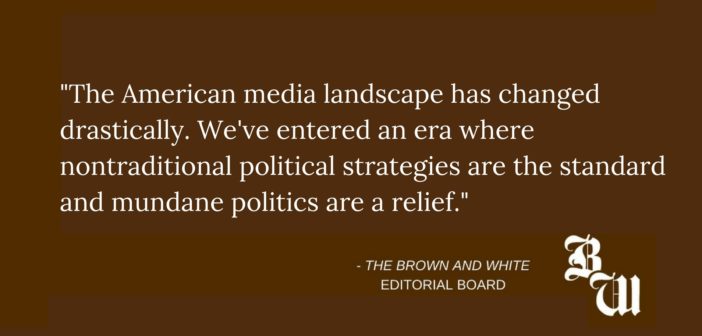Reality seems more like satire every day.
Since satire’s first publicized use in 1862, writers have approached unpopular, unprofessional or unexpected events with an appreciation for society’s most unusual aspects. The medium resonates with people, providing fun, entertaining takes on serious issues of the day.
When Jon Stewart took over “The Daily Show” in 1999, satire in American television took off beyond the set of “Saturday Night Live.” Known for his unapologetic attitude toward bullshit, Stewart’s success inspired various “Daily Show” alum to branch off in their own directions.
Stephen Colbert. John Oliver. Trevor Noah. Samantha Bee. Jordan Klepper.
Stewart always rejected the notion that he was a journalist. When The Brown and White discussed it a year ago, satire was purely a supplement for people already watching more traditional news.
In the past year, the American media landscape has changed drastically. We’ve entered an era where nontraditional political strategies are the standard and mundane politics are a relief.
And more and more funny people are starting to take things seriously.
Traditional journalists have boundaries. The five journalistic principles are meant to guide how interviews are translated into stories, from the accuracy of an official’s statement to independence from any particular group or organization.
Satirists differ in their approach to fairness and impartiality. The job of entertainers, comedians especially, is to write material based on their thoughts and current events and what they think will make their audiences laugh.
Satire seems more like reality every day. Each host serves as a political moderator — voices of reason in a new era of political process. They’re not worried about public backlash. They’re more concerned with addressing the human elements of every developing story.
Comedians can be more blunt than journalists. They say, “That person lied? OK, they’re a liar.” What’s more important is how those lies affect the lives of millions of constituents relying on that politician to work for their benefit.
Oliver excels at this in particular. On HBO, he has the freedom to say and cover whatever he wants. Instead of following the big news of the day, less prominent stories that would likely go unnoticed otherwise are brought to national attention. While he leans left, he presents objective facts before giving his personal opinions.
Viewers have developed expectations for comedy and satire of Oliver’s quality. People were outraged when “Saturday Night Live” failed to address Harvey Weinstein’s sexual assaults until a week after it was publicized. When his segment finally aired, many remained unsatisfied.
The ridiculousness of today’s political climate blurs the line between comedy and news. A different story breaks nearly every day, yet people seem more upset about humorous skits coming from “Saturday Night Live” than original articles coming from news outlets.
The outrage isn’t limited to satire. Jimmy Kimmel, whose son was born with a rare heart defect, accused Republican Sen. Bill Cassidy of lying about the plan to repeal and replace the Affordable Care Act. Kimmel said without access to top-quality health care, his son would not be alive.
Cassidy said that while he is funny, Kimmel doesn’t understand the complexity of the Affordable Care Act. “Jimmy Kimmel Live!,” once viewed as an apolitical show, was denounced by conservatives across the country.
Satire today is inherently progressive. The intersection of politics and humor would not be complete without addressing partisanship.
There’s a reason why conservative satire isn’t nearly as prevalent — making fun of the shortfalls in people, government and well-established institutions brings criticism and complaints.
If a show has wide viewership, a host has two options: they can retain viewers by playing it safe, or they can speak their values when they feel it’s necessary, at the risk of being labeled biased.
The funny people are choosing the latter.






Comment policy
Comments posted to The Brown and White website are reviewed by a moderator before being approved. Incendiary speech or harassing language, including comments targeted at individuals, may be deemed unacceptable and not published. Spam and other soliciting will also be declined.
The Brown and White also reserves the right to not publish entirely anonymous comments.